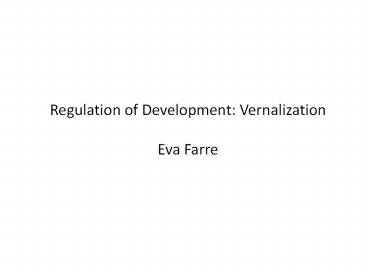Regulation of Development: Vernalization - PowerPoint PPT Presentation
Title:
Regulation of Development: Vernalization
Description:
... Circadian Clock Photoperiodism 1 2 2 3 3 Germination, flowering, bud setting, tuberization, leaf senescence, juvenile to adult transition External factors: ... – PowerPoint PPT presentation
Number of Views:293
Avg rating:3.0/5.0
Title: Regulation of Development: Vernalization
1
Regulation of Development Vernalization Eva
Farre
2
- Topics
- Overview on developmental transitions
- Overview on the regulation of flowering
- Regulation of flowering vernalization
3
Which developmental transitions occur in
plants? Which factors regulate them?
4
Germination
Juvenile
Vegetative
Juvenile
Adult
Reproductive
Adult
5
Time Transition to Flowering so that Reproduction
Occurs at Appropriate Time of Year.
6
Light quality
Vernalization
Photoperiod
Autonomous
Gibberellin Signaling (SD)
Flowering time integrators
Meristem identity genes
Floral Transition
How did they find all these genes?
Putterill et al., 2004
7
Summer and winter henbane (B) and Arabidopsis
(C). Inductive photoperiods but no vernalization.
Brassica oleracea (biennial cabbage). Obligate
vernalization requirement. 5 years without cold
treatment.
8
Vernalization (status 1996) the promotion of
flowering in response to prolonged exposure to
low temperature (2-8 weeks at 4C). Accelerates
flowering of most late flowering mutants, the one
that more is fca. Quantitative relationship
between length of cold treatment and acceleration
of flowering (Napp-Zinn, 1987) Transmitted by
mitosis but not meiosis (Evans, 1960) DNA
metylation might be involved (Burns et all,
1993) FRIGIDA ? FLOWERING-LOCUS C
9
Cloning of FRI
Napp-Zinn (1955) The following aspects of the
subject are reviewed (1) conventional analysis
of vernalization genes in wheat, peas and
Arabidopsis (2) population genetics and gene
geography and (3) physiological
genetics. Arabidopsis Stockholm (late) vs Li5
(early)
Li
Li Stockholm FRI allele
Johansen et al., 2000
10
COL
Natural variation of FRI alleles
Ler
Other factors involved
Johansen et al., 2000
11
Cloning of FLC a MADS box protein induced by FRI
and repressed by cold
Cloning of FLC problems neither Ler nor Col
respond to vernalization Col has a non
functioning FRI Ler has a weak FLC allele
Ler FRI-Sf2
Ler
Ler with a FRI allele from another accession is
still early flowering
MUTAGENESIS
Col with a FRI allele from another accession
Michaels Amasino (1999)
12
(Michaels Amasino 2000)
Extra copies of FLC converts Arabidopsis to a
biennial requiring vernalization to flower.
13
Who represses FLC?
Light quality
Vernalization
Autonomous
Photoperiod
Gibberellin Signaling (SD)
Floral Transition
14
How does cold repress FLC expression?
Autonomous pathway
15
Who represses FLC? The VRN genes
FCA
vrn mutants vrn1 and vrn2 have no memory but
feel cold vrn3 no memory nor cold sensation
Chandler et al., 1996
16
vrn2 mutants have no cold memory
17
VRN's are DNA binding proteins
VRN1 a B3-domain containing DNA binding protein
(H3K9 methylation) VRN2 component of Polycomb
repressor complex that mediates H3-K27
methylation VIN3 PHD (plant homeodomain protein)
18
Who activates FLC?
Light quality
Vernalization
Photoperiod
Autonomous
PAF complex
Gibberellin Signaling (SD)
Floral Transition
PAF RNA polymerase II associated fact What is
the phenotype of PAF complex mutants?
Oh et al., 2004 (van Nocker lab) He et al., 2004
Putterill et al., 2004
19
FLC
He Amasino 2005
20
FLC expression and histone modifications
HIstones
21
ELF early flowering VIP vernalization
insensitive PIE photoperiod indpendent early
flowering
H3-K4 methylation gene activation
H3-K9, H3-K27 methylation gene inactivation
22
FLC
He Amasino 2005
23
FLC promoter modifications
Methylation
Acetylation
FLC
He Amasino 2005
24
Conservation of the control of flowering? Flowerin
g in long-day cereals
25
ARBIDOPSIS
CEREALS
Long days
Long days
PPD1
Vernalization
Vernalization
CO
CO
FRI
FT
VRN2
VRN1
FT
FLC
AP1
VRN1
Flowering
Flowering
Cereal genes VRN2 zinc-finger motif and CCT
domain, similar to CO VRN1 MADS box TF (as FLC,
SOC1 etc.) modifications found in early
flowering varieties
26
- Thursday
- Circadian Clock
- Photoperiodism
27
(No Transcript)
28
(No Transcript)
29
1
30
2
31
2
32
3
33
3
34
vin3
vrn2
vrn1
4
35
BUT Who senses the cold directly?































